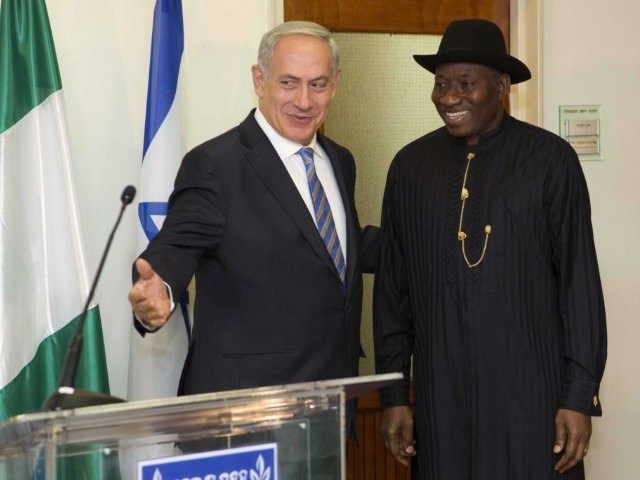The government of Palestinian leader Mahmoud Abbas began the year with a resounding loss at the United Nations, failing to win a bid for the organization to recognize Palestine as a state.The move failed largely due to one member of the Security Council, Nigeria, abstaining from the vote.
That vote, previously a near-guarantee in Palestine’s favor, has turned, and some suggest Boko Haram’s radical Islamist terror in Nigeria’s northeast could have contributed to the pivot.
The decision to abstain from the vote on Palestinian statehood last week was reported by Nigerian papers to have been a “last-minute” one. As the nation’s Daily Trust reports, Nigerian ambassadors to the United Nations had previously been open to the idea of a two-state solution for Israel and the Palestinian territories, with a former Nigerian foreign minister calling in 2011 for “a solution whereby two states, Palestine and Israel, will live peacefully side-by-side’.”
Those on the left immediately blamed the United States and Israel for Nigeria’s abstention. UK left-wing newspaper The Guardian cited a Palestinian source who claimed leaders believed that Nigeria would vote with them “even half an hour before the vote,” but efforts were thwarted by personal conversations that President Goodluck Jonathan engaged in with Secretary of State John Kerry and Israeli Prime Minister Benjamin Netanyahu. Palestinian representative Muhannad al-Akluk later told the news service Ma’an that Nigeria’s decision to abstain was a “disappointment” and a “shock.”
Muslim groups within Nigeria also condemned their own government’s move. The Muslim Rights Concern (MURIC) in Nigeria released a damning statement accusing the government of cowardice:
The latest support for Zionist Israel which is notorious for killing unarmed civilians, women and children is therefore most baffling, uncharacteristically cowardly, highly reprehensible, long in impunity but short in principle.
Nigeria’s population is divided almost equally between Christians and Muslims, with a higher concentration of Muslims in the north and east and higher concentration of Christians in the south and west. And it is precisely the situation facing Muslim civilians in the northwest states of Nigeria that can inform the government’s decision to side against Palestine (by siding with no one at all) in the Security Council vote.
The major difference between politics in Nigeria in 2011, when Foreign Minister Olugbenga Ashiru called for a two-state solution, and today is that radical Islamist terrorism has infiltrated Nigeria like never before. And a major debate has brewed between Nigerian and American officials for months on whether Boko Haram is a true radical Islamist threat or the product of “poor government service delivery” and “poverty.” Under Secretary of State Hillary Clinton, the Department of State refused to designate Boko Haram an international terrorist threat, instead dismissing the group as a “local grievance.”
Emmanuel Ogebe, an international human rights attorney representing victims of Boko Haram in Nigeria, explained to Breitbart News that a growing relationship between Israel and Nigeria built on facing a common threat and identifying it for what it is may be developing. President Jonathan became the first head of state of his nation to visit Israel last year, which Ogebe notes may be “indicative of a possible expansion of bilateral interests that may even extend to security cooperation.” Israel vowed to send counter-terrorism professionals to Nigeria after the mass kidnapping of hundreds of girls in Chibok, Borno, the territory most besieged by Boko Haram.
Israel’s help came at a time at which, Ogebe notes, US-Nigeria relations are at a “nose-dive” thanks to the Obama administration in part blaming the Nigerian government itself for its inability to find and return the Chibok girls to safety. “It is therefore conceivable that as the U.S. blames Nigeria for the failure to #bringbackourgirls, Nigeria may have found an alternate ally,” he notes.
Most important, Ogebe notes, Israel’s government was not hesitant in identifying Boko Haram as a jihadist threat. “Unlike the U.S., which portrays Nigeria’s jihadi terrorism as economically-driven and even President Jonathan’s fault,” he notes, “Prime Minister Netanyahu got major social media hits in Nigeria for accurately ascribing it to global Islamist extremism during his UN remarks.” President Jonathan might have “finally found an experienced player who really gets it.”
Jonathan’s government faces unprecedented challenges for the nation in the wake of Boko Haram’s rise to power. Boko Haram controls 70,000 square miles of land in Nigeria–six times the amount of land currently under control of the Islamic State–and, as the resistance to Nigeria’s abstention at the UN last week shows, Nigeria remains a divided country to lead. Under his tenure, however, it appears that Nigeria is willing to ease into the role of cooperative partner with Israel in ways no other President has shown interest in.

COMMENTS
Please let us know if you're having issues with commenting.